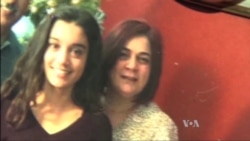The husband-and-wife terror suspects, who police said opened fire at the Inland Regional Center in San Bernardino, California, killing 14 people and wounding 21 others, later died in a shootout with law enforcement.
While investigators continue to sift through clues about what led to the mass shooting, the small worldwide Assyrian community is coming to grips with the loss of one of its own among the victims.
Arlen Verdehyou is still trying to understand what the loss of his wife, Benneta Betbadal, means for his family.
“She was a great wife, a wife who would take care of her family. Great cook, great mom. She was an angel,” Verdehyou said.
Jenni Kosse is still calculating what the loss of her friend and co-worker will mean for the San Bernardino County Health Department.
“She was a very good inspector. Even management would come to her if they weren’t sure of an answer, they would go to her,” Kosse said.
Ramond Takhsh is still coming to terms with Betbadal’s absence as a Scout parent and member of the Assyrian American Association of Southern California.
“Her kids were involved, she was an active parent in the Boy Scout troop, teaching the Assyrian language, so she was a teacher, a friend to everyone here,” said Takhsh.
As the San Bernardino terrorist attack made headlines around the world, Takhsh said it sent a shockwave through the small, worldwide Assyrian community.
“There’s no official census but there’s numbers roughly as many as 4 million and as low as 2 million around the world, and it’s overwhelmingly a Christian minority,” said Takhsh.
Takhsh added that there are about 10- to 15,000 Assyrians like Betbadal who live in Southern California, including refugees from Iraq and Syria.
“The majority is probably Assyrians from Iran... which is where Betbadal was born in 1969. On the Go Fund Me site established to fund her memorial, it states that Betbadal “fled to America at the age of 18 to escape Islamic extremism and the persecution of Christians that followed the Iranian Revolution," Takhsh said.
Kosse said while she sometimes expressed concerns for her family still in Iran, she rarely talked about her journey with co-workers.
“Most of the time she just didn't want to relive it. She was here now, and she just wanted to move forward,” said Kosse.
The Islamic extremism that Betbadal fled in Iran ultimately found her in the place where she sought refuge, and adopted as her new home.
“For 31 years she’s been here, and now she’s gone, in the hands of, as you say, Islamic fanatic,” said her husband.
But while her friends and family grieve, Jolen Betbadal, her daughter said that is the last thing she would want.
“She would always say that she never wanted anybody to be sad for her if she went. Like she would want people happy, she wouldn’t want them grieving or crying or anything,” said Betbadal.
Betbadal’s family plans to hold a public, Catholic funeral December 14th.






